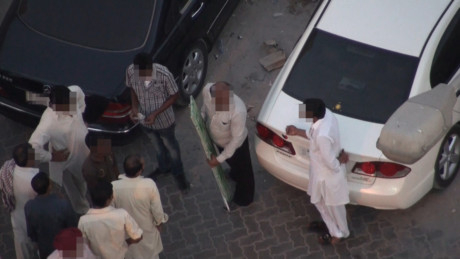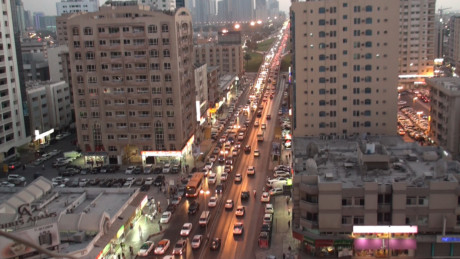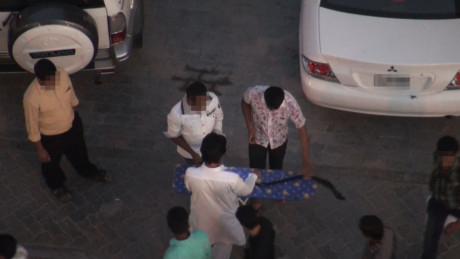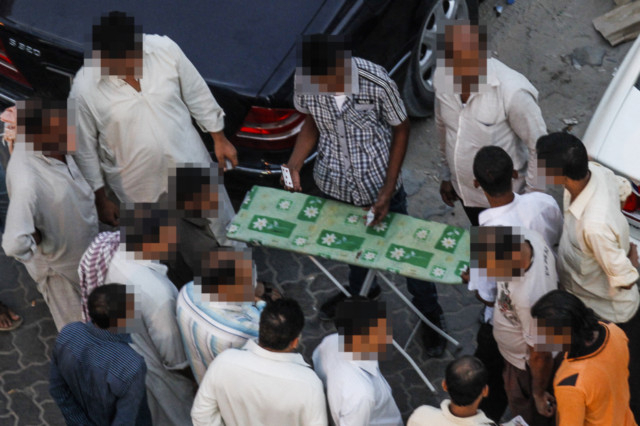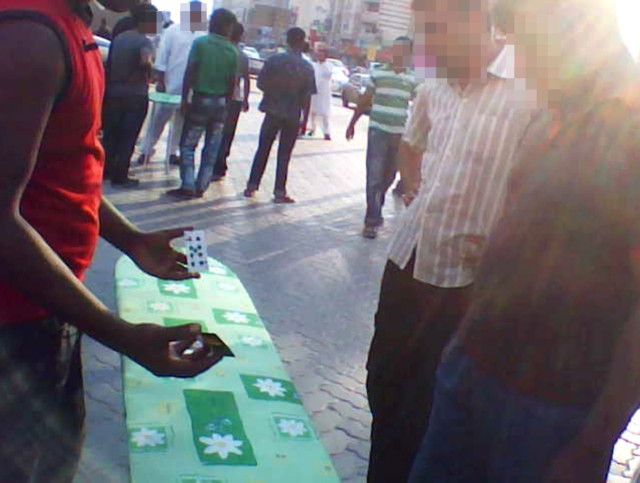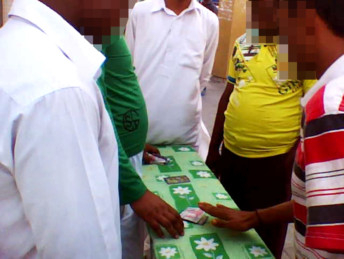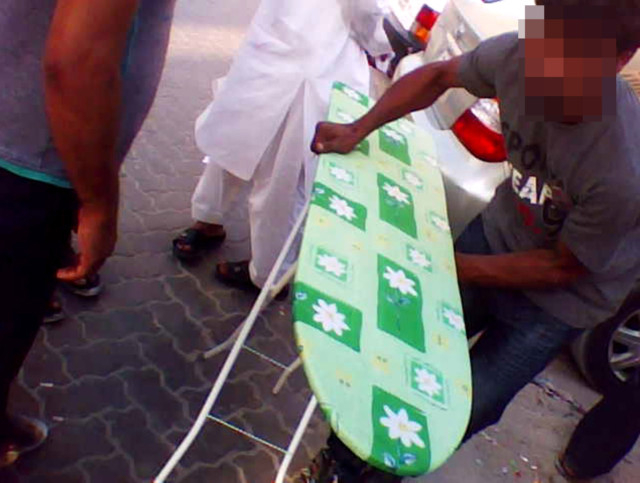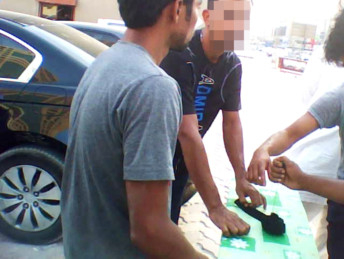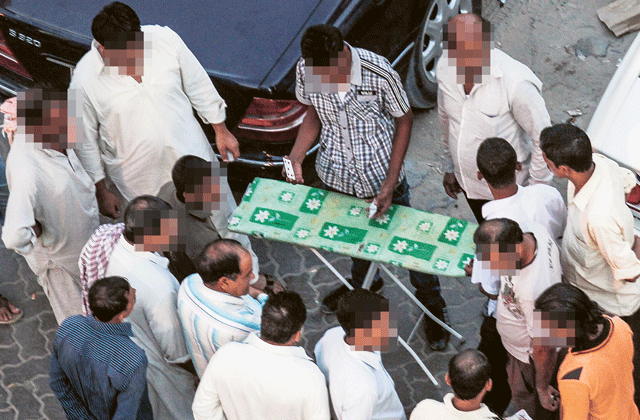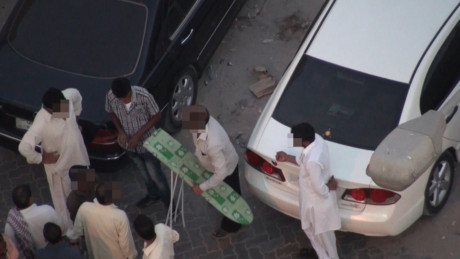
Sharjah: It’s 5pm on a typical weekend and Sharjah’s main marketplace, Rolla, is humming with the evening crowds.
But not everybody is out shopping. On the sidewalks of busy Al Arouba Street there is a big knot of people - their attention intently focused on an ironing table. A Bangladeshi man with a glazed look eggs the bystanders on: “Sau lagayega do sau payega, paanch sau lagayega hazar lejayega (put in Dh100 you will get Dh200, put in Dh500 you walk away with Dh1,000).”
Soon an Indian construction worker, Rafiq, 45, takes the bait. As he puts Dh100 on the ironing board, the bookie digs into a bag. Out comes a screwdriver and a coiled trouser belt. He lays the belt on the table and hands the screwdriver to Rafiq.
The challenge is to put the screwdriver into the coiled belt. If it comes out loose when the belt is unrolled, Rafiq loses; if it remains stuck he gets twice his money back.
Rafiq makes two attempts. No luck. He swears angrily and moves to the next table. With a tiny camera discreetly hidden in my shirt pocket I follow him.
Here an even bigger group is engrossed in a three-card monte game also known as the three-card trick. “Aaja bhai, aaja, himmat wala aadmi chahiye” (C’mon folks, we want somebody with courage here) shouts a man as he picks out three cards -- two black and one red -- and places them face down on the ironing table.
If Rafiq can pick out the red card he will win an amount equal to what he has wagered. If he doesn’t, he will lose it all.
Rafiq tries his luck three times. But each time he ends up picking the wrong card.
He doesn’t express any profanity now. Instead he throws his hand in the air dismissively. “What happened?” I enquire. “Disaster. I was to send home money for Eid. That’s not happening,” he tells me with a crestfallen face.
Within half an hour Rafiq has lost Dh600 -- nearly half his month’s salary - on just two tables. As he starts the long trudge back to his labour camp more gambling tables spring up. The tables come on taxis, bikes, private cars and - in one case – tucked under the arm.
By 6.30pm there are six tables on the 100-metre stretch between KM Trading department store and Arab Bank. The tables will operate until midnight.
As the atmosphere gets turbo-charged and the crowd of punters thickens, one operator ups the stake. “Paanch sau. hazar waley idhar aao (Come here if you want to place bets for Dh500-Dh1,000) he shouts above the din.
Thousands of dirhams change hands. But rarely does anyone win. Those who do are decoys used to entice others with their fake winnings. They are as much a part of the gambling network as the dozens of lookouts hired to alert the operators when they spot a police car.
At the lookout’s signal, the ironing tables are quickly folded and shoved underneath the cars parked in an adjacent sand patch. The operators disperse and disappear in the crowd. When the coast is clear, they return.
We secretly capture everything. Our videographer Sunita Menon and photographer Ahmed Ramzan zoom in on the scenes from a high-rise while I mingle with the gamblers to catch the action with my own camera.
By nightfall each table has made between Dh5,000 and Dh7,000.
“On a good day we make even Dh10,000,” an operator boasts as he leafs through a thick wad of notes with his tobacco-stained fingers.
Most of his ill-gotten gains have come from low-paid subcontinent workers who throng Rolla in their thousands on weekends.
Invariably, many fall into the gambling trap.
Gambling is illegal in the UAE and those found guilty can be jailed for two years followed by deportation. For those who operate the betting games, the jail term can extend up to 10 years followed by deportation.
In August, two Bangladeshis were arrested in Sharjah in separate cases of gambling. One placed bets on cards while the other ran a screw-belt game.
In 2011, Dubai prosecutors heard 11 cases of roadside screw-belt gambling. Abu Dhabi police nabbed 23 Asians for gambling in July. In all cases, the same tools were improvised: ironing table, screwdriver, belt and a deck of playing cards.
Despite regular police crackdowns and strict punishments the gambling juggernaut rolls on -- not in a rundown labour camp on the outskirts - but on a busy street in the heart of Sharjah.
Bahraini executive Dheya Ali, 42, whose building overlooks the gambling scene, said he lives in constant fear. “A couple of nights back, two drunk gamblers tried to prise open my car door while I was still inside with my daughter and looking for a parking space. We got really scared,” said Ali. “These anti-social elements also peddle paan and pirated CDs and use cars parked in the sandy area to store their illegal wares. Violent drunken brawls erupt between the gamblers every few days. They fight with sticks and pelt stones at each other, causing heavy damage to the cars. My own car has been damaged at least seven times. We call the police but when they come, these men slip away. It has happened so many times I have lost count,” said Ali.
An Indian student said who lives in the same building said his parents repeatedly caution him to stay away from the ‘trouble-makers’.
“The authorities should stop this. It’s a disease. People lose all sense of the money on the gambling table. You’re thinking just one more chance, just one more and before you realise it you have lost everything,’ said Fazlu, a middle-aged lorry driver from Pakistan.
A few months back Fazlu lost Dh1,000. “I saw people winning so easily I couldn’t resist. I won a few rounds, but after that it was all downhill. It was a set-up, a dirty trap. They let me win initially so that I could play more.”
So what is he doing here again? “Nothing, just whiling away my time,” he said.
Confronting the operators can be foolhardy. Fazlu knows that. But an Afghan worker found this out a bit too late. Realising that he has been cheated, he returned with five friends to get back the Dh2,000 he lost to a screw-belt game operator. A worker at a nearby shop recalls that night: “There was a big fight, the Afghans came armed with sticks, but they were outnumbered by the Bangladeshis and beaten back. The screwdriver can be a handy weapon, you see.”
Back at the tables, the betting reaches fever pitch. I jostle through the crowd to get a better view, but a burly man stands in my way. “Brother, we’ve been watching you for some time. Don’t hang around here. Either play or get lost,” he orders.
I nod in compliance and head back to my car, hoping our cameras have not missed anything.


